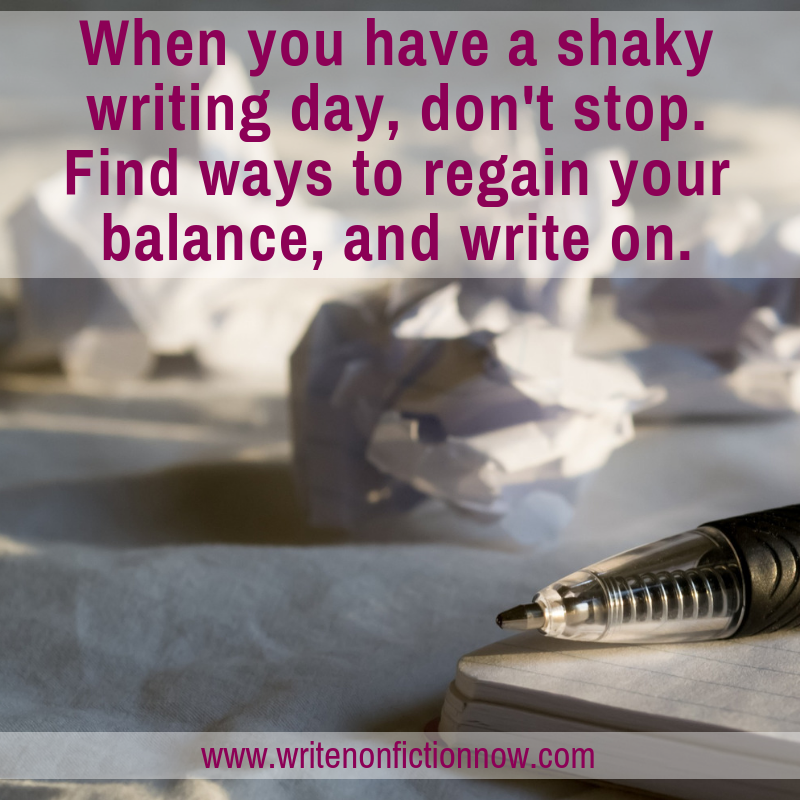Wednesday, September 12, 2018

Writing can be tough, and sometimes it takes you in unplanned directions. So what do you do when you feel a bit shaky—unsure if you should continue writing at all or in the direction your work has flowed? Today, professional writer Deb Hemley (
@dhemley) explores why writers write—even when it’s tough—and offers advice on to keep you writing no matter how discouraged you become or off track you get.
When you feel stuck, stymied and as you are stumbling through the first of many manuscript drafts, you may question why you put yourself through this laborious process, and you don’t abandon the whole writing thing once and for all.
But for many writers, it isn’t so easy. Writing becomes an integral part of your identity, part of your makeup. Writing becomes the lens for how you view the world, and how you negotiate a head filled with overflowing thoughts.
At some point, you may need to clarify and declare for yourself why you continue on this path. You also may need to discover why why some of your stories ache to be told when you easily are set others free—and why some have a life of their own.
Writing becomes an integral part of your identity, part of your makeup.Click To Tweet
Why Writers Write
I find myself curious a lot of the time about why writers write. It’s no wonder, therefore, that I love when authors divulge their reasons. Sometimes I come across the information through published conversations with authors, and other times I feel compelled to ask the question:
Why do you write?There are so many different perspectives. Here are a few:
To Find Out What I Know
Author,
Patricia Hampl once stated, “I don’t write about what I know: I write in order to find out what I know.”
To Find Out What I’m Thinking and Looking At
Author,
Joan Didion says in her essay,
Why I Write, “I write entirely to find out what I’m thinking, what I’m looking at, what I see, and what it means. What I want and what I fear.” She goes on to say that her most absorbed and passionate hours are spent “arranging words on pieces of paper.”
To Understand How I Make Meaning in My Life
My writer friend, J, says she writes “to understand how I make meaning in my life—past and present. Peeling back layers and looking deeper at just what exactly is going on in my life has been rewarding. But if I can’t articulate ‘it’ I haven’t really understood it deeply enough. Through the articulation, I discover new ideas, realizations for myself. Sometimes it takes me a very long time to figure out what triggered the idea for the piece and what it is
really about vs. a surface idea that sparked my attention.”
The Insights are Rewarding
My writer friend, S, says, “I think that part of why I stick with the writing is that I am stubborn. I have always had in my head that I would try to write about F (an older person she befriended during her childhood) and how she influenced my life. I cannot seem to let go of that, even when I seriously wonder if perhaps I should ditch the memoir idea and simply focus on an essay about her with traces of how I was influenced by her. Parts of the memoir writing are hard and discouraging beyond anything I anticipated, but other parts are rewarding in and of themselves for the insights that jump out at me about my family, my relationships with friends, etc. And I enjoy fussing with sentences, finding the word I want. That aspect of writing never bores me or discourages me!”
I already know the meaning of the story
Several years ago, M, a writer friend, who’d recently returned from a trip to the Grand Canyon, told me about her adventures. The story about her journey was nothing short of gripping. During the roughly 30-minute telling of the story, I kept thinking that this would be a fascinating essay. I asked M, an excellent writer, whether she planned to write about the experience. “No need” she replied without skipping a beat, “I already know the meaning of the story for me.”
Writing becomes the lens for how you view the world.Click To Tweet
When New Information Effects Balance
Writing can be a moving target, and what we decide to include in our work can change and be influenced by the events in the world around us. No matter how new information sways us, our writing brings us back to balance.
In the days and weeks since I began thinking about this article, I learned about the passing of
Aretha Franklin, “The Queen of Soul.” In the immediate hours following her death I heard people talking about her everywhere I went. Radio stations were playing her most famous songs, and everyone from politicians, fellow musicians, and regular folks were all talking about the influence she had on them personally as well as the fabric of the United States.
My writer friend, S, whose memoir spans several decades through the civil rights and women’s movement, has been getting close to finishing her manuscript. Aretha’s passing couldn’t go unnoticed. “I am writing a bit in the memoir about Aretha Franklin. That’s one of the things I like about writing. When some new remembrance or totally new idea springs up as a result of the news, or a walk in the woods, or a conversation with my daughter, I can’t stop thinking about how to write about it.”
As filmmaker
Spike Lee was preparing to shoot his recent movie, BlacKkKlansman the riots in Charlottesville, Virginia occurred. Lee decided to include the footage. “We knew it was tricky because if done wrong, it could feel exploitative. But we decided shortly after it happened to include that footage. [Spike Lee] wrote it into the screenplay, and as soon as we saw the revised draft come through, all of us went, ‘That’s it.’ It ties the entire movie together in the most profound and emotionally effective way.”
Stick with the writing process. It always reaps rewards if you do.Click To Tweet
The Acrobatics of Writing
Writers need to be agile—willing to walk unchartered paths, open to dig deeper and weather new elements. After all, sometimes life or the writing itself takes you somewhere you didn’t plan to go.
I find guidance on the days my writing seems to swing me in a new direction from the perspective shared by author
Susan Henderson. “Occasional departures off the main track are good since they can ‘deepen’ a work and make it ‘breathe,’ but in the revision stage, one must keep that main plotline, tightrope firmly in mind…As long as you keep some part of your hand or foot connected at all times to the tightrope, you can stretch to the sides and to the sky, and you can even hang upside-down. Just don’t lose contact with the rope,” she advises.
The next time you feel mired down in your manuscript and question the wisdom of continuing to plow ahead with your writing endeavors, take a moment for reflection, ask yourself why you write. On post-it notes, write down your reason. Plaster these notes all over your home to remind you of your answer.
When you’re having difficulty staying on track, hold onto a metaphorical rope. Let yourself swing to the sides, be lifted to the sky and hang upside-down. Then consider whether the departure you are taking will deepen your work or if it’s time to get back on your original path.
Remember why you write. And stick with the writing process. It always reaps rewards if you do.
Do you know why you write? What happens when a new event relates to a piece you are working on? Can you maintain contact with your plotline even when you stray a bit? Tell me in a comment below.About the Author
 Deb Hemley
Deb Hemley writes memoir, personal essay, short fiction, and articles about social media. She has published pieces in
Biographile, Hippocampus Magazine, All That Matters, and
Survivor’s Review. You can follow her on Twitter
@dhemley.
Photo courtesy of David Iskander on UnsplashThe post
Why Writers Write Even When It Feels Hard appeared first on
Write Nonfiction NOW!.
Nina Amir, the bestselling author of How to Blog a Book and The Author Training Manual, is a speaker, a blogger, and an author, book, blog-to-book, and high-performance coach. Known as the Inspiration to Creation Coach, she helps creative people combine their passion and purpose so they move from idea to inspired action and positively and meaningfully impact the world as writers, bloggers, authorpreneurs, and blogpreneurs. Some of Nina’s clients have sold 300,000+ copies of their books, landed deals with major publishing houses and created thriving businesses around their books. She is the founder of National Nonfiction Writing Month, National Book Blogging Month, and the Nonfiction Writers’ University. As a hybrid author she has published 19 books and had as many as four books on the Amazon Top 100 list at the same time. Her most recent book is called Creative Visualization for Writers, and tomorrow her 19th book will be released, The Write Nonfiction NOW! Guide to Creativity and Flow. Find all her books at booksbyninaamir.com or find out more about her at ninaamir.com.